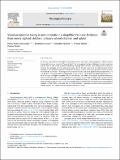Visual perspective taking is not automatic in a simplified Dot task: Evidence from newly sighted children, primary school children and adults
Author(s)
Rubio-Fernandez, Paula; Long, Madeleine; Shukla, Vishakha; Bhatia, Vrinda; Sinha, Pawan
DownloadPublished version (2.572Mb)
Publisher with Creative Commons License
Publisher with Creative Commons License
Creative Commons Attribution
Terms of use
Metadata
Show full item recordAbstract
In the Dot task, children and adults involuntarily compute an avatar's visual perspective, which has been interpreted by some as automatic Theory of Mind. This interpretation has been challenged by other researchers arguing that the task reveals automatic attentional orienting. Here we tested a new interpretation of previous findings: the seemingly automatic processes revealed by the Dot task result from the high Executive Control demands of this verification paradigm, which taxes short-term memory and imposes perspective-switching costs. We tested this hypothesis in three experiments conducted in India with newly sighted children (Experiment 1; N = 5; all girls), neurotypical children (Experiment 2; ages 5-10; N = 90; 38 girls) and adults (Experiment 3; N = 30; 18 women) in a highly simplified version of the Dot task. No evidence of automatic perspective-taking was observed, although all groups revealed perspective-taking costs. A newly sighted child and the youngest children in our sample also showed an egocentric bias, which disappeared by age 10, confirming that visual perspective taking develops during the school years. We conclude that the standard Dot task imposes such methodological demands on both children and adults that the alleged evidence of automatic processes (either mindreading or domain general) may simply reveal limitations in Executive Control.
Date issued
2022Department
Massachusetts Institute of Technology. Department of Brain and Cognitive SciencesJournal
Neuropsychologia
Publisher
Elsevier BV
Citation
Rubio-Fernandez, Paula, Long, Madeleine, Shukla, Vishakha, Bhatia, Vrinda and Sinha, Pawan. 2022. "Visual perspective taking is not automatic in a simplified Dot task: Evidence from newly sighted children, primary school children and adults." Neuropsychologia, 172.
Version: Final published version